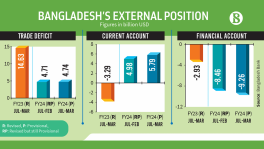Tackling human trafficking
Hakan HK Catalan is a special agent who works for the United States Department of Homeland Security. He specialises in human trafficking investigations and has been working to stop the trafficking for a long time

HK came to Bangladesh in February to conduct a workshop on "Countering Trafficking in Persons in Bangladesh: Investigating and Prosecuting Human Trafficking Cases."
Thousands of women and children are illegally trafficked every year from Bangladesh to different countries, due to the low conviction in trafficking cases.
According to the 2016 Global Report on Trafficking in Persons of the UN Office on Drugs and Crime (UNODC), Bangladesh reported just 10 to 15 convictions per year in human trafficking cases.
In 2012, Bangladesh enacted the Prevention and Suppression of Human Trafficking Act (PSHTA). However, the conviction is 0.4%, according to police headquarters.
In an exclusive conversation with The Business Standard, HK talks about his work, possible collaboration between the US and Bangladesh governments, and much more.
What are the challenges for Bangladesh to stop human trafficking?
The most difficult challenge for Bangladesh is ignorance of the issue. First, people need to be educated and informed about human trafficking. Although the US has resources, when it comes to awareness on human trafficking we have the same problem as you do. In fact, this interview will also be helpful. Getting publications is the biggest challenge here.
Getting your society to understand what human trafficking looks like, and how it works, is very important. You have to talk about it and begin the dialogue. Media can play an important role in raising awareness.
How can the Bangladeshi and the US governments work together to stop human trafficking?
I believe there are many grounds on which both governments can work together. I mentioned it in the class during my workshop. I came am here to talk about how to investigate human trafficking cases from my experience. I failed in many cases but I also succeeded in quite a few.
I believe we are heading in the right direction. Bangladesh is a great country, and the government sent people for the training and to begin the dialogue. That is a good start. It is also highly important to get the private sector involved in the process.
How helpful could the mainstream media be to make people aware of human trafficking and help law enforcement agencies?
As I said already, the media has a vital role to play in this regard. In Hollywood, actors and media personalities speak up about such issues and take a stand on human rights topics.
For example, actor Ashton Kutcher launched an anti-human trafficking non-profit organisation and testified before Congress on ending modern-day slavery. He has been talking about it in the Hollywood circle. Many TV shows and documentaries are made in Hollywood on human trafficking.
Are human traffickers from all walks of life and race? What does your experience say?
Do you know what motivates traffickers or smugglers? It is their greed for money. A trafficker could be anybody, from all walks of life, and race. The bottom line of human trafficking is, somebody is trying to make money using someone else – which is why it is called modern-day slavery.

In most cases, we always see that girls or women are the victims of human trafficking. However, have you rescued a male victim?
Yes, I have. I didn't work directly on that case. But in one particular instance, I worked with a colleague and a law enforcement agency, rescuing a young boy who was trafficked. Traffickers made the boy look like a young girl to sell him for sex.
However, boys often don't speak up if they are sexually harassed. That has to change, and the change is coming. It doesn't matter what the gender of a child is – they are children and children should be protected and kept safe.
It is also a matter of shame when an adult takes advantage of a young person based on their sexual orientation as well.
As we know, victims come from different backgrounds in terms of religion, ethnicity, and race. How do you help your victims get settled in their normal life again?
That is a great question. Each case is different. I am blessed because I come from a very diverse background. My mother is of Turkish and Russian descent, and she grew up as a Muslim. And my father is African-American and Spanish. He grew up as a Catholic.
My parents taught me at an early age to be a good person. Having a Muslim side in my family, we understand the cultural barriers. I think I have been blessed to experience such cultural diversity and dynamics in my family.
Thus, when I come across victims of a certain race or religion, I realise that I have to put my thinking cap on and consider how to approach the family. I have to find out whether they are conservative or not. In America we have people coming from different countries. Subsequently, we have to be prepared for that to handle these situations.
I help the families to accept their child and forgive them because it is not their fault. In fact, they were victims. As special agents, we get trained on how far we have to go and when to draw the line. However, the victim's family also becomes a priority in the rehabilitation process.
How did you get involved in this profession?
I always knew I wanted to help people. And luckily, when I was in college, I got an opportunity to do an internship with the US secret service – the special agency that protects the US President. I was fortunate enough to complete the paid internship successfully. I enjoyed working with the people at the secret service.
In 2004, I ended up becoming a policeman when I was 21 years old. Then I worked my way up to becoming a special agent at the US Immigration and Customs Enforcement agency.
Tell us about your first human trafficking case
My first encounter was with the San Diego Police Department when I was assigned to a special task force, Internet Crimes Against Children (ICAC). I was working on child exploitation cases. Basically, back then, I was investigating paedophiles who were involved in making child pornography.
While investigating child prostitution cases at the San Diego Police department, I learned more about human trafficking.
The first case I came across was of a young girl who was trafficked for the purpose of sexual exploitation. She was only 14 years old and she was pimped (trafficked) out by a group called, "PHD."
Later, the police department was able to arrest the traffickers.
What is the most difficult part of your job?
There is no difficult part of the job per se. But sometimes, I'd say, the only difficult part for me is the bureaucracy that we have to undergo.
Very often we have to wait for the paperwork to be done. That is the only frustrating part, but it is not super frustrating. I don't see anybody pushing back against you when you say, "I want to save a child's life."
I enjoy doing my job, as at the end of the day, saving a child or a young woman is rewarding. When I received a message from a mother, thanking me for putting their family together – that was the best part of my job for me.
Does your job affect your mental health or do you suffer from any kind of trauma after working these cases for many years?
I do not. I use it as an opportunity to help people as I believe we are all part of the same world. People asked me this question before. But I wake up happy every morning. I am unhappy when I am not working on these cases. That's the punishment for me.
We get clinical psychologists to talk about all these because they know what we go through. And psychologists told me, "You are good, it is good to see how you put a spin on it for yourself."
I believe evil does exist and bad things happen, but I also believe that the worst thing happens when good people don't do anything to stop the evil.
Which US states are affected the most by human trafficking?
I would say, in the US, the most vulnerable state is Nevada, because Las Vegas is in there. Next are New York and California, but they are doing great work to stop human trafficking.
The catch is, traffickers target those cities because they are big and have a large population. And it is hard to keep track of everything.
Sometimes, lack of proper education and knowledge on the nature of human trafficking makes the situation worse. It is just like the challenge of educating people here in Bangladesh about human trafficking and smuggling. That is why we try to conduct these workshops and presentations across the United States. I believe we could do more of these workshops and presentations here in Bangladesh.


 Keep updated, follow The Business Standard's Google news channel
Keep updated, follow The Business Standard's Google news channel
















